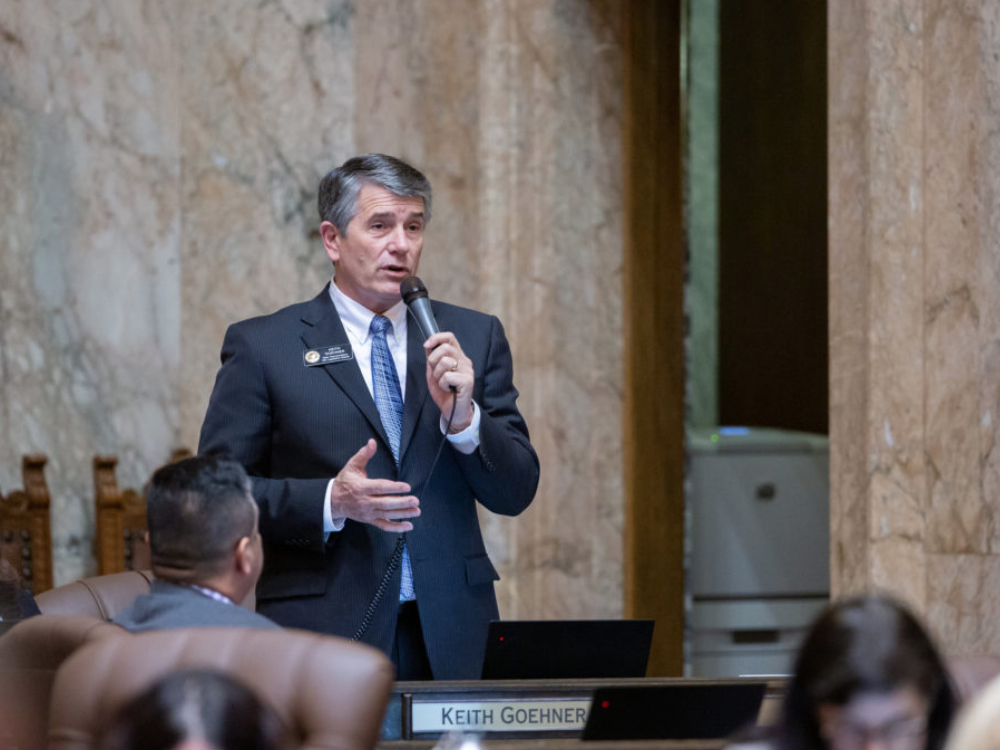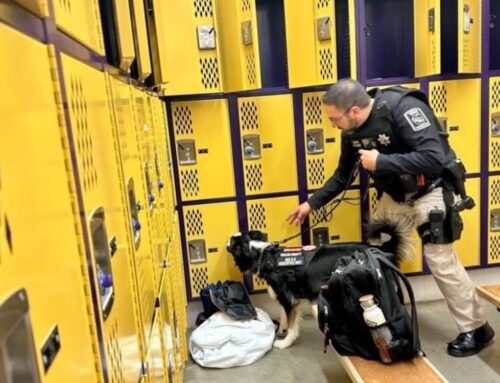2022 Virtual session, priority issues need to be addressed
information and graphics released by Rep. Goehner
Dear Friends and Neighbors: The 2022 legislative session started on Monday, Jan. 10. The state House of Representatives is operating virtually just like last year. Only two members from each caucus and a presiding officer are allowed on the House floor. Legislators and staff who are on the House floor must have proof of vaccination as well as a booster shot. The public is not allowed in the galleries and all committee meetings are online.
The plan is to review the operation guidelines every couple of weeks and make adjustments or changes if possible. The current operation plan was supported by the majority party. House Republican leadership did not support the plan as there had been agreement to have approximately one-third of the legislators on the floor at a time.
The Legislature should be able to follow public health guidelines while meeting in-person to conduct the people’s business. Children are going to school and many others are going to work every day. Transparency and accountability are lacking in the virtual session.
While I cannot be on the House floor at this time, I am in Olympia because there are opportunities to have in-person meetings and attend caucus meetings.

Legislative priorities
Long-term care tax: I have heard from many of you about the WA Cares Fund or long-term care payroll tax and program. The majority party passed this legislation in 2019, but both parties now agree this is flawed public policy. More than 443,000 workers tried to get out of the program through an exemption, while thousands more wanted to opt-out, but could not, because they were unable to secure a qualified policy before the deadline.
There are a number of bills to modify or delay this law. House Republicans have introduced House Bill 1594, which would fully repeal the program and payroll tax, and House Bill 1913, which would repeal the long-term care mandate and replace it with an affordable and optional alternative.
Democrats have offered their own alternatives in House Bill 1732, which only delays the tax and program. It passed the Appropriations Committee by a vote of 31-2, so there is agreement to at least delay the program at this point. House Bill 1733, which offers some exemptions, passed by a vote of 23-10. The full House may vote on these bills this week. For more information on the Long-Term Care Act, click here.
Emergency powers reform: Washington state has been under a “state of emergency” and one-person rule for almost two years. Our state government was never intended for this governor, or any other governor, to have that much power.
There are a number of bills to amend or limit the governor’s emergency powers. This week, House Republicans introduced a new bill with bipartisan support – House Bill 1772. This would increase the Legislature’s involvement in gubernatorial proclamations relating to a state of emergency. Our leadership has sent a letter to House Speaker Laurie Jinkins requesting passage of this legislation. This is a reasonable proposal to address the disparity between the executive and legislative branches we have experienced during the pandemic. Click here for more on our efforts to address emergency powers.
Public safety: Last session, the majority party passed a package of law enforcement bills that have made our communities less safe. It is driving good law enforcement officers out of the profession at a time when we need them most. In fact, in 2020, Washington ranked 51st out of the 50 states and District of Columbia in terms of the number of police officers per thousand people. That has been the case for 11 consecutive years.
As we heard from law enforcement across the state, the legislation passed last year has placed unrealistic standards on law enforcement officials for arrests and pursuits, and taken away too many tools related to de-escalation tactics and equipment. Republicans have introduced legislation that would:
- House Bill 1737: Improve public safety;
- House Bill 1788: Address vehicular pursuits;
- House Bill 1787: Provide funding for the recruitment, retention, and support of law enforcement officers; and
- House Bill 1656: Change the definition of theft.
Check out our Safe Washington Plan.
Click here for more of our House Republican priorities.
Transportation solutions: Reprioritizing Existing Appropriations for Longevity (REAL) Act
In my last email update, I discussed The REAL Act, our House Republican transportation proposal. Here is a more detailed breakdown of what that legislation would include:
The REAL Act is:
- House Bill 1603: REAL Act which would shift specific transportation programs to be paid for by the general fund beginning in 2025.
- House Bill 1604: Directs state sales tax paid on motor vehicles to be used for preservation and maintenance of the existing transportation system.
- House Bill 1605: Creates a program at the Washington State Department of Transportation (WSDOT) to implement rural safety lane departure improvements.
- House Bill 1606: Recognizes fish passage barrier projects as inherently correcting environmental justice concerns without further review or process.
- House Bill 1607: Investigates a shift of the Safe Routes to School Program to the Office of the Superintendent of Public Instruction (OSPI) with the direction to better coordinate funding for safe pathways to new schools.
- House Bill 1608: Directs the executive branch to address barriers to recruitment for Washington State Ferries in future collective bargaining agreements.
- House Bill 1249: Transfers sales tax paid on transportation projects to the transportation budget.
- House Bill 1528 (which I’ve sponsored): Puts a pause on the commute trip reduction program in light of COVID-19.
It is time for a new, innovative approach to address our transportation needs. I am hopeful the majority party will work with us on these proposals. They supported my amendment last year in the transportation budget that would have taken a more proactive approach to creating a sustainable and resilient transportation spending plan until the governor vetoed it.
Governor requires hospitals to halt nonurgent procedures
On Jan. 13, Gov. Inslee issued an emergency order temporarily restricting hospitals from performing nonurgent healthcare services, procedures and surgeries. The order which takes effect today, Jan. 17, also prohibits all hospitals from utilizing personal protective equipment other than according to a conventional capacity strategy.
I understand the governor’s concern with COVID cases counts up significantly. However, I believe this is a decision that should be left up to hospitals and local health officials. When the coronavirus hit in 2020, I heard of numerous accounts of people having surgical procedures delayed, which weren’t considered urgent at the time, only to have their health or situation become worse due to the postponement. We do not want anyone to have to go through that again.
Increasing access to water and sewer systems
I introduced legislation this session, House Bill 1627, that would make it possible for more properties to have access to water, storm drains, and sanitary sewage systems. It has received good support. The public hearing went well last week, and the House Local Government Committee is expected to vote the bill out of committee this week. The legislation would:
- allow urban government services to be extended beyond city and urban growth area boundaries to meet the needs of those living within such communities. Water, sanitary sewage systems, and storm drains could also be provided to properties outside of these boundaries to protect basic public health, safety, welfare, and the environment.
- not allow the Growth Management Hearings Board nor a boundary review board to hear petitions based on the existence or extension of water, storm drainage, or sewerage systems outside of a city or urban growth areas boundary, and a city or county may not be found out of compliance under the Growth Management Act based on the provision of such services.
- allow for additional development and services in limited areas of more intensive rural development, based on the needs of the people in those communities.
Follow the Legislature
Since we are in another virtual session, I encourage you to stay engaged and follow the Legislature as best you can. It is important you provide input on issues that matter to you and our state.
Please continue to contact me with any questions, concerns or comments you have. I appreciate the feedback, as it helps me represent the 12th District in the Legislature.
Here are some websites and links that may help you stay engaged, testify or comment on legislation this session.
- The Ledger – a legislative news aggregator
- Capitol Buzz – Daily news clips
- How you can be involved in the legislative process
- How to comment on a bill
- Committee Sign-In – Remote Testimony
It is an honor to serve the 12th District in the state House of Representatives.
Sincerely,

Keith Goehner
12th Legislative District
RepresentativeKeithGoehner.com
122C Legislative Building | P.O. Box 40600 | Olympia, WA 98504-0600
keith.goehner@leg.wa.gov
360-786-7954 | Toll-free: (800) 562-6000








